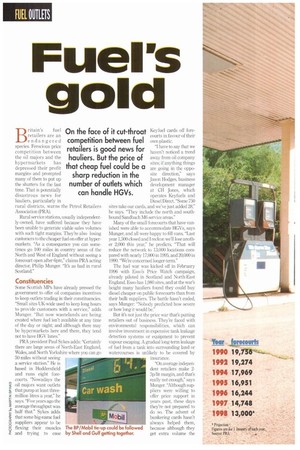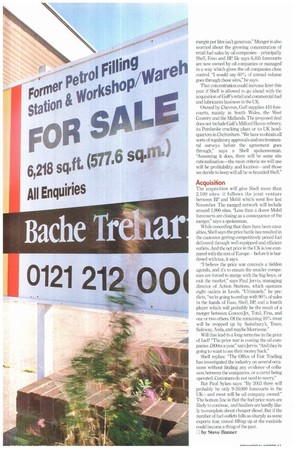Fuel's gold
Page 52

Page 53

If you've noticed an error in this article please click here to report it so we can fix it.
Britain's fuel
retailers are an endangered species. Ferocious price competition between the oil majors and the hypermarkets has depressed their profit margins and prompted many of them to put up the shutters for the last time. That is potentially disastrous news for hauliers, particularly in rural districts, warns the Petrol Retailers Association (PRA).
Rural service stations, usually independently-owned, have suffered because they have been unable to generate viable sales volumes with such tight margins. They're also losing customers to the cheaper fuel on offer at hypermarkets. "As a consequence you can sometimes go 100 miles in country areas of the North and West of England without seeing a forecourt open after 6pm," claims PRA acting director, Philip Munger. "It's as bad in rural Scotland."
Constituencies
Some Scottish MPs have already pressed the government to offer oil companies incentives to keep outlets trading in their constituencies. "Small sites UK-wide used to keep long hours to provide customers with a service," adds Munger. But now wastelands are being created where fuel isn't available at any time of the day or night; and although there may be hypermarkets here and there, they tend not to have HGV lanes." Keyfuel cards off forecourts in favour of their own plastic.
"I have to say that we haven't noticed a trend away from oil company sites; if anything things are going in the opposite direction," says Jason Hodges, business development manager at CH Jones, which operates Keyfuels and Diesel Direct. "Some 750 sites take our cards, and we've just added 28," he says. "They include the north and southbound Sandbach M6 service areas."
Many of the small forecourts that have vanished were able to accommodate HGVs, says Munger, and all were happy to fill vans. "Last year 1,500 closed and I reckon we'll lose another 2,000 this year," he predicts. "That will reduce the network to 13,000 locations compared with nearly 17,000 in 1995, and 20,000 in 1990. "We're concerned longer-term."
The fuel war was kicked off in February 1996 with Esso's Price Watch campaign, already piloted in Scotland and North-East England. Esso has 1,980 sites, and at the war's height many hauliers found they could buy diesel cheaper on public forecourts than from their bulk suppliers. The battle hasn't ended, says Munger: "Nobody predicted how severe or how long it would be."
But it's not just the price war that's putting retailers out of business. They're faced with environmental responsibilities, which can involve investment in expensive tank leakage detection systems or equipment to prevent vapour escaping. A gradual long-term leakage of fuel from a tank into surrounding land or watercourses is unlikely to be covered by insurance.
"On average independent retailers make 23p/lit margin, and that's really not enough," says Munger. "Although suppliers were willing to offer price support in years past, these days they're not prepared to do so. The advent of bunkering cards hasn't always helped them, because although they get extra volume the
margin per litre isn't generous." Munger is also worried about the growing concentration of retail fuel sales by oil companies--principally Shell, ESSO and BP. He says 6,405 forecourts are now owned by oil companies or managed in a way which gives the oil companies close control. "I would say 60% of annual volume goes through those sites," he says.
That concentration could increase later this year if Shell is allowed to go ahead with the acquisition of Gulf's retail and commercial fuel and lubricants business in the UK.
Owned by Chevron, Gulf supplies 410 forecourts, mainly in South Wales, the West Country and the Midlands The proposed deal does not include Gulf's Milford Haven refinery, its Pembroke cracking plant or its UK headquarters in Cheltenham. "We have to obtain all sorts of regulatory approvals and environmental surveys before the agreement goes through," says a Shell spokeswoman. "Assuming it does, there will he some site rationalisation—the main criteria we will use will be profitability and location—and those we decide to keep will all be re-branded Shell."
The acquisition will give Shell more than 2,100 sites: it follows the joint venture between BP and Mobil which went live last November. The merged network will include around 1,900 sites. "Less than a dozen Mobil forecourts are closing as a consequence of the merger," says a spokesman.
While conceding that there have been casualties, Shell says the price battle has resulted in the customer getting competitively priced fuel delivered through well-equipped and efficient outlets. And the net price in the UK is low compared with the rest of Europe--before it is burdened with tax, it says.
"I believe the price war conceals a hidden agenda, and it's to ensure the smaller companies are forced to merge with the big boys, or exit the market," says Paul Jervis, managing director of Action Stations, which operates eight outlets in Leeds. "Ultimately," he predicts, "we're going to end up with 90% of sales in the hands of Esso, Shell, BP, and a fourth player which will probably be the result of a merger between Conoco/Jet, Total, Fina, and one or two others. Of the remaining 10% most will be mopped up by Sainsbury's, Tesco, Safeway, Asda, and maybe Morrisons."
Will this lead to a long-term rise in the price of fuel? "The price war is casting the oil companies £800m a year," says Jervis. "And they're going to want to see their money back."
Shell replies: The Office of Fair Trading has investigated the industry on several occasions without finding any evidence of collusion between the companies, or a cartel being operated. Customers do not need to worry."
But Paul Sykes says: "By 2003 there will probably be only 9-10,000 forecourts in the UK—and most will be oil company owned." The bottom line is that the fuel price wars are likely to continue, and hauliers are hardly likely to complain about cheaper diesel. But if the number of fuel outlets falls as sharply as some experts fear, casual filling up at the roadside could become a thing of the past.
E by Steve Banner
















































































































